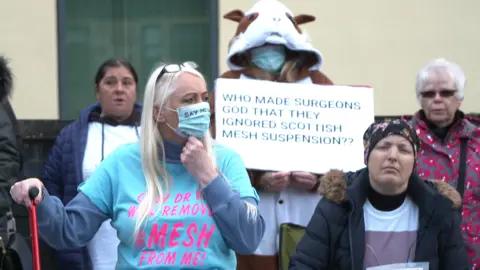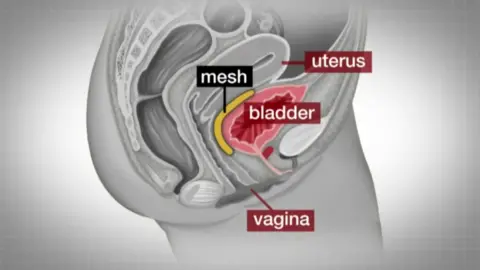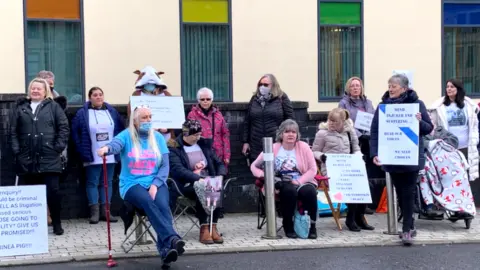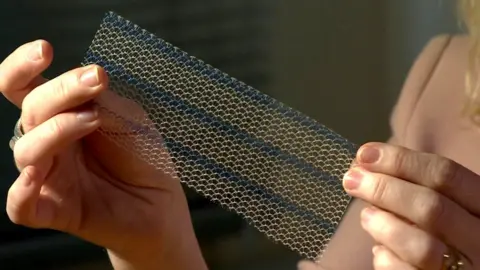Mesh implant patients challenge government over surgery delays
 BBC
BBCWomen requiring the surgical removal of mesh implants have said "very little" has happened since a landmark Scottish government announcement in the summer.
The pledge means patients can now receive free treatment from specialists in America and England.
But campaigners said initial assessments in Glasgow were taking up to two years.
The Scottish government said it was working with NHS Specialist Services to improve waiting times.
A protest was held outside the New Victoria Hospital in Glasgow on Wednesday and the issue was debated in the Scottish Parliament.
MSPs agreed the general principle of a bill which would see people reimbursed if they have already paid to have their mesh implant removed privately.
Implant use was stopped in Scotland after hundreds of women were left with painful, life-changing side effects.
In July, the Scottish government announced surgery and travel costs to Spire Health Care in Bristol and the Mercy Hospital in Missouri in the United States would be covered.
The cost of each procedure is estimated to be £16,000 to £23,000.
Mesh implants have been used to treat conditions some women suffer after childbirth, such as incontinence and prolapse.

What are mesh implants?

- The mesh, usually made from synthetic polypropylene, is intended to repair damaged or weakened tissue
- Over 20 years, more than 100,000 women across the UK - including more than 20,000 in Scotland - had transvaginal mesh implants. They are used to treat pelvic organ prolapse (POP) and stress urinary incontinence (SUI), often after childbirth.
- While the vast majority suffer no side effects, the use of mesh in Scotland was suspended except in "exceptional circumstances" in 2014 after it emerged some women suffered painful side effects
- Use of the procedure was halted in 2018
- Once the mesh is implanted, it is very difficult to remove

'The system doesn't seem fit for purpose'

Isabelle McLafferty, of Scottish Mesh Survivors, told BBC Radio's Good Morning Scotland that patients had to be assessed in Glasgow but new referrals were taking "anything up to two years".
She believes the pandemic and NHS waiting times have played a part in the delays but she added: "The actual system that has operated for the Glasgow Mesh Centre does not seem fit for purpose.
"Women are receiving appointments and then it is being cancelled a week in advance.
"One lady had been scheduled to be seen today and is now not being seen until May/June 2022."
Asked how she was managing, the retired teacher said: "Each day can be completely different. I don't plan anything any more.
"Each day I can wake up and one day I can be fine, other days I am in pain constantly down my leg which creates issues with my mobility."
She added that she also suffers from intermittent issues with her bowel and bladder.
'We don't want to be guinea pigs any more'

Marian Kenny, who is waiting on surgery to remove a mesh implant. joined the protest outside the New Victoria Hospital and admitted she felt "deflated" by the lack of progress in recent months.
She told BBC Scotland: "For so much of this fight, we have been fighting to get it stopped and this is the only time we have been fighting for ourselves.
"We don't want to be guinea pigs any more."
Ms Kenny also shared her frustration over the fact she is not making plans to travel to America for a life-changing operation.
"I am devastated at the fact we can't get this moving," she added.
Health Secretary Humza Yousaf acknowledged the pain, suffering and distress mesh survivors have been through.
He said he hoped to finalise contracts with the clinics in Bristol and Missouri "as quickly as we possibly can".
Mr Yousaf added: "I would hope to have an update relatively soon.
"I know they have been waiting too long and I promise them I don't want them to be waiting any longer than they have to."

MSPs later agreed the general principles of the Transvaginal Mesh Removal (Cost Reimbursement) (Scotland) Bill.
The chamber heard harrowing examples of women who have had implants, including some who have died as a result.
During the debate Mr Yousaf was critical of the fact that some survivors felt they had no choice but to fund their own surgery.
He added: "It is wrong that some women thought the only option was to dig into their own pockets."
Scottish Conservative health spokesman Dr Sandesh Gulhane was among the MSPs who spoke in support of the legislation.
He added: "The very least we can do together is ensure that any woman who received this treatment in Scotland would be compensated for the money they have paid out for mesh removal services, even if they had that treatment overseas."
